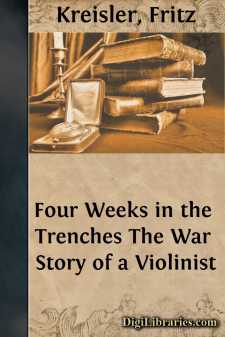Biography & Autobiography
- Adventurers & Explorers 15
- Artists, Architects, Photographers 16
- Business 2
- Composers & Musicians 14
- Criminals & Outlaws 5
- Editors, Journalists, Publishers 6
- Educators 1
- Entertainment & Performing Arts 3
- General 73
- Health, Exercise & Fitness 1
- Historians 3
- Historical 83
- Law Enforcement 1
- Lawyers & Judges 3
- Literary 147
- Medical 7
- Military 48
- Naturalists, Gardeners, Environmentalists 8
- Personal Memoirs & Diaries 226
- Philosophers 3
- Political 9
- Presidents & Heads of State 38
- Religious 38
- Rich & Famous 27
- Scientists 13
- Women 31
Biography & Autobiography Books
Sort by:
by:
Mildred Aldrich
I La Creste, Huiry, Couilly. S et M. September 16, 1914 Dear Old Girl:— More and more I find that we humans are queer animals. All through those early, busy, exciting days of September,—can it be only a fortnight ago?—I was possessed, like the "busy bee," to "employ each shining hour" by writing out my adventures. Yet, no sooner was the menace of those days gone, than, for days at...
more...
by:
Frederick Palmer
I"Le Brave Belge!" The rush from Monterey, in Mexico, when a telegram said that general European war was inevitable; the run and jump on board the Lusitania at New York the night that war was declared by England against Germany; the Atlantic passage on the liner of ineffaceable memory, a suspense broken by fragments of war news by wireless; the arrival in England before the war was a week old;...
more...
by:
Fritz Kreisler
I In trying to recall my impressions during my short war duty as an officer in the Austrian Army, I find that my recollections of this period are very uneven and confused. Some of the experiences stand out with absolute clearness; others, however, are blurred. Two or three events which took place in different localities seem merged into one, while in other instances recollection of the chronological...
more...
CHAPTER I LANDING AT HAVRE—TORTONI'S—FOLLOWTHE TRAM LINES—ORDERS FOR THE FRONT Gliding up the Seine, on a transport crammed to the lid with troops, in the still, cold hours of a November morning, was my debut into the war. It was about 6 a.m. when our boat silently slipped along past the great wooden sheds, posts and complications of Havre Harbour. I had spent most of the twelve-hour trip...
more...
CHAPTER ILEAVE HOME—BASE HOSPITAL NO. 11—CAMP DODGE "Very well then, Father, you have my permission and best wishes." How the approving words and blessing of good Archbishop Mundelein thrilled me that memorable morning in 1918. The rain-washed freshness of April was abroad in Cass street; and the soft breeze, swaying the curtain of the Chancery window where he was seated, brought incense of...
more...
by:
Conway Evans
We had been travelling for many weeks,—Lyra Nickerson, Katherine Schermerhorn, and I,—and after a beautiful tour through Germany, we arrived at Berlin on the evening of July 29, 1914. We had planned to spend a few days there preparatory to embarking at Hamburg in the Viktoria Luise for a northern cruise, and were looking forward to a short stay in the splendid capital. When we had secured our rooms...
more...
CHAPTER I OFF TO THE FRONT I had been to France before—in 1916, during the Battle of the Somme—but not as an officer; in 1916 I was a private in the Royal Fusiliers, and I had received orders to return to "Blighty" in order to proceed to an officer cadet battalion at Gailes, in Ayrshire, before I had been able to see what a front-line trench was like. So this, then, was my first experience...
more...
Chapter I. When the sun arose on the 22nd of June, 1918, three great transports were lying out in the stream of New York harbor. They were filled with American soldiers for duties overseas. They were well camouflaged and well convoyed. The previous afternoon they had pulled away from a Jersey City pier, where they had taken on their human cargoes, and they were undoubtedly under sealed orders. They had...
more...
by:
Eric Fisher Wood
CHAPTER I AT THE AMERICAN EMBASSY Paris, Tuesday, August 4th. I presented myself at the American Embassy today and offered my services to Mr. Herrick. They were promptly accepted. I was put to work with such suddenness that no time was spent in determining my official status. I cannot say whether I am a doorman or an Attaché. At present the duties of the two seem to be identical. Now, as in 1870, the...
more...
by:
John Hargrave
CHAPTER I. IN WHICH MY KING AND COUNTRY NEED ME I left the office of The Scout, 28 Maiden Lane, W.C., on September 8th, 1914, took leave of the editor and the staff, said farewell to my little camp in the beech-woods of Buckinghamshire and to my woodcraft scouts, bade good-bye to my father, and went off to enlist in the Royal Army Medical Corps. I made my way to the Marylebone recruiting office, and...
more...











